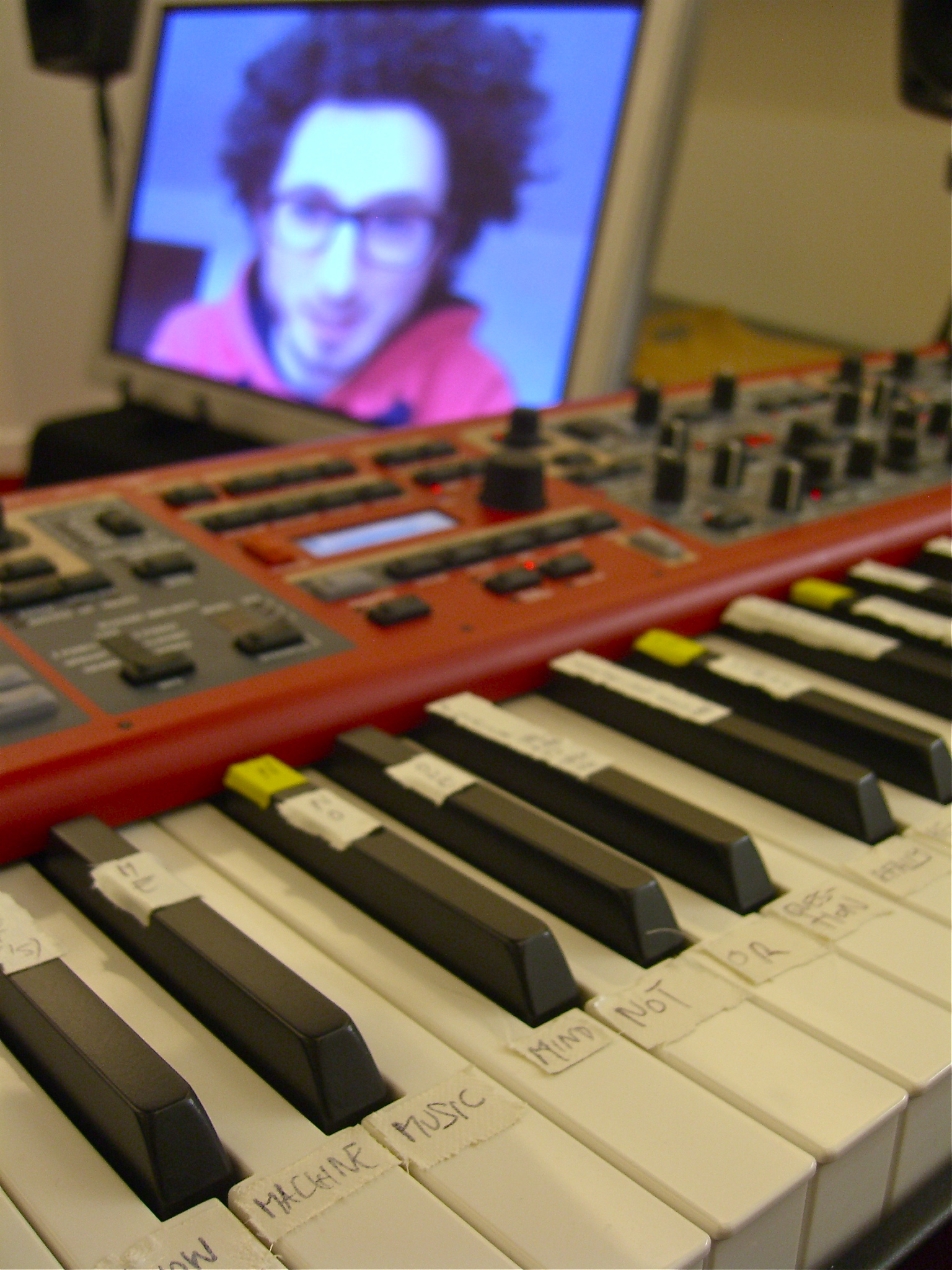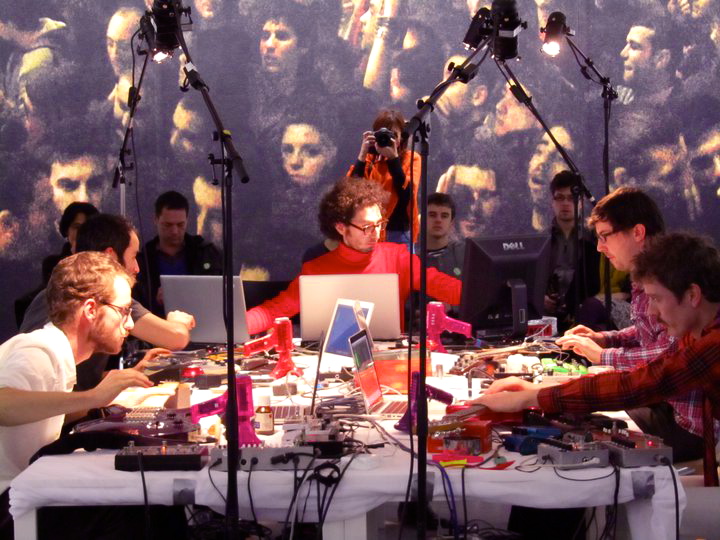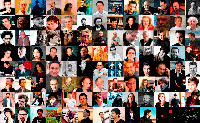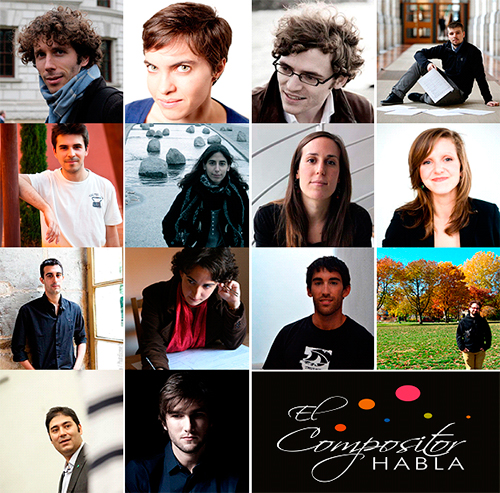Entrevistas
Stefan Prins | Interview with Stefan Prins
06/05/2017
Interview. Stefan Prins is one of the most surprising and original voices of the current compositional scene and undoubtedly a composer worth following. We talked to him and this is what he told us.
"...I am the music I write..."
.jpg) 1. Ruth Prieto: Who is Stefan Prins?
1. Ruth Prieto: Who is Stefan Prins? Stefan Prins: I am the people I love and care for, I am the country I was born in (Belgium), and the countries I have lived in (Belgium, Spain, USA, Germany), I am the values that my family has passed on to me, I am my memories (sometimes even a bit too much), I am some kind of weird sum of my physical identity and my many virtual identities (facebook-Stefan, soundcloud-Stefan, youtube-Stefan, website-Stefan, …), I am the music I write (oh yes: I am a composer, first and formost!), the music I perform (I am an improviser too, making music with my laptop), the music I listen to, the dance and theatre performances I see (recently I saw Romeo Castellucci’s very powerful “Democracy in America”), the books I read (I love to read fiction – I just read Roth’s “The Plot Against America”, which actually barely feels like fiction today), the films I see (recently Jarmusch’s “Patterson” touched me deeply and I’m eagerly awaiting Michael Haneke’s new film – although I always fear his films too), the expositions I visit (a few weeks ago I was blown away by an exposition of Omer Fast’s video-works), the musicians I work with, the ensemble I am co-directing with one of my closest friends, Pieter Matthynssens (Nadar Ensemble), the institutions I studied at, the people I studied with (the piano teacher who fuelled my love for music as a youngster, Peter Vanderkoelen, my composition teachers Luc Van Hove, Chaya Czernowin, Hans Tutschku, Steve Takasugi), the people I coached myself, …And there are also days when I am things I don’t want to be.
2. R.P.: Which characteristic defines you best?
Stefan Prins: As we all do, I have many contradicting (or to put it differently: complementary) character traits. It’s hard to isolate traits from that particular mix, but to name a few: I think generally I am a positive and even keeled person. I like to work hard. I can be rather direct.
"I’m more of a listener than a talker"
3. R.P.: What is your DNA as a composer?
Stefan Prins: My path as a composer so far has been interrupted a few times. Each interruption (and how I got back to composing) speaks about my DNA as a composer I think. As a youngster I initially came to composing through playing piano music from mainly the late nineteenth and twentieth century. I started to compose relatively soon, but then felt so intimidated by the master pieces which I by then was playing on the piano myself (and heard in the concert halls), that I stopped composing. However, that musical tradition is still very close to me (I can still marvel when I hear Mahler or Prokofiev). In my late teens, early twenties, I was very much attracted by some of Pierre Boulez’s music (especially “Répons” and “Pli Selon Pli” were ear-opening for me). I dived into his thinking and writing, and although I felt the urge to compose again, those writings unfortunately paralyzed me creatively. It is through hearing and then playing improvised music that I could overcome that paralysis and started to compose again, finding a freedom and joy in dealing with sound matter itself. Improvising musicians (such as Fred Van Hove, Evan Parker, Peter Evans, Peter Jacquemyn, and Thomas Olbrechts and Joachim Devillé, two friends/musicians with whom I have played for many years in the trio “collectief reFLEXible”) have since been a tremendous influence in my work. More or less at the same time I discovered the music of Lachenmann, who has been very important for me – both through his music and through his thinking about music.
4. R.P.: What is composition for you in this day and age?
Stefan Prins: Although we’re obviously living in very different times than 500, 200, 100, 30 or even 10 years ago, I think the core of what composition today is not so different from what it was in the past: an attempt to relate to/reflect on/deal with the society the composer lives in through the medium of sound (possibly adding other media to that mix).
Today’s society, however, is different from before in that it is a highly mediated and technologized one. I strongly believe in what pioneering video artist Lilian Schwartz said:
"Artists must express their own creative character in the technology of their era in order to find their own historical and individual level."
I understand technology in this context not only as the technological objects that surround us, but also as the “language” they speak and the systems and structures they imply and create.
Besides sound, my work also often includes other media, like video, or makes use of technological devices that surround us in our everyday world (webcams, smartphones, tablets, game controllers, sound recorders,).
5. R.P.: What inspires you as a composer and why?
Stefan Prins: Basically everything can inspire me: a TV series, the behaviour of people in the subway, a novel, a scientific research paper, visual art, dance, theatre, a new technological device … Rarely the first trigger to my fantasy and inspiration is sound: most of the time it’s an idea or a concept that doesn’t have to do with music per se, which then informs a sonic/audio-visual setting. I’m very much interested in the hybrid body and the hybrid (augmented) reality it today lives in.
6. R.P.: What is your main obsession when working?
Stefan Prins: “Making sense”. The questions “why am I doing this?”, “what does this mean?”, “what does this communicate?” are constantly buzzing in my head. It’s also important for my peace of mind to have the feeling that I’m somehow able to move forward in each new composition – even if it’s a tiny step:
"I want to have the feeling that I’m evolving, developing, growing, instead of treading water."
7. R.P.: Could you describe your creative process?
Stefan Prins: This is different from piece to piece. Sometimes – mainly when I make purely electro-acoustic work – it’s really about the pleasure of getting my hands dirty with sound, and the piece naturally grows out of this, in a rather wild and unpredictable process of discovery. These pieces, which –contrary to what I described above - mostly don’t start from a concept. They often turn out to be studies for upcoming, bigger pieces. Often I make these electro-acoustic pieces after having finished a big project, as a kind of antidote, counter balance to the complexity of those multi-dimensional projects.
I can sit on ideas for a long time, develop it conceptually, and construct the framework (technologically, instrumentally, dramaturgically…) of the piece and only then do I dig into the sonic (and if applicable visual/theatrical/…) material, putting the dots on the paper so to speak. Before doing so, however, I often have workshops and recording sessions with (some of) the musicians who will perform the work for the first time, discovering the idiosyncrasies of their playing, which then also influences the sonic material I use. For bigger projects I often collaborate with a videographer (I often work with the wonderful Kobe Wens), software programmer (such as Josiah Oberholtzer or Vincent Jacobs) or with a scenographer (for example with Marieke Berendsen for Mirror Box Extensions). Most of the times I involve them early on in the creative process, so that they can also influence the result.
 8. R.P.: What are you working on now?
8. R.P.: What are you working on now? Stefan Prins: I’ve started working on a rather ambitious project, which will dominate my schedule for the next 15 months: an evening-length composition for ensemble, conductor, 8 dancers, scenography, live-electronics and live-video, to be premiered at the Münchener Biennale in June 2018. This project has been in the works for the past 3 years, when I started developing the ideas for it together with the fantastic choregrapher/dancer Daniel Linehan. Never before have I worked on such a scope - musically, organisationally, conceptually, financially… I cannot say too much about the project yet besides that it touches upon the ideas of privacy, mediation, corporality, virtuality and power, and that so far the collaboration with Daniel has been very harmonious, thrilling and enriching. We started developing this project together, literally from scratch, from a white page, and soon found common grounds and interests.
9. R.P.: Can you define «contemporary»? And in which way Stefan Prins is “contemporary”?
Stefan Prins: If what one creates has a link to the world and time in which it is created, I would say it’s contemporary. What that link is, is harder to define.
There are multiple links with the world I live in and my work, going from the technological artefacts I use to the ideas in which the piece is framed.
10. R.P.: If you had not been a composer, what would you like to have been?
Stefan Prins: Since my late teens I have never wanted anything else than being involved with creating music. Initially I wanted to be a concert pianist, but the image I had of myself was to become a conductor. Once I started to seriously dedicate myself to composing music, it became clear that this is what I want to dedicate my life to.
11. R.P.: In this personal "inventory" that we all have of noises, sounds, music and songs, what can you tell us about your soundscape?
Stefan Prins: Every sound can end up in my music, it’s the context that defines what will eventually. Generally speaking my heart/ear/soul resonates a lot with noisy, raw, distorted sounds and energetic textures. But I’m falling in love with pitched (non-tonal) harmony again. I’m sure I’ll answer this question differently in a few years.
12. R.P.: ¿What does silence sound like?
Stefan Prins: What doesn’t it sound like?
13. R.P: Have you got any eccentricities when composing?
Stefan Prins: Not really. I need my big mug of black coffee to start the composing day, but who can barely call that eccentric.
14. R.P.: ¿How do you see the contemporary music scene today?
Stefan Prins: I have the impression that the contemporary music scene has been moving quite a bit over the past years, and that more recently there even seems to be some kind of acceleration.
On one side the contemporary music scene seems to be embracing more and more ideas, concepts, tools and practices that can be found - for a while already - in other performative (and non-performative) arts. At the most recent edition of the legendary Darmstadt Summer courses (2016) the sound technicians told me that of all the official concerts only a few did not involve any amplification and or other contemporary technology, whereas only a few editions ago the situation was literally the inverse. More and more composers are rediscovering the performer’s body, extending classical performance practices towards performance art. The concert format too is being questioned and extended. More and more performers, ensembles and organisers don’t ‘just’ place compositions back to back when developing concert programs but curate unique events in which the sonic parameter is only one of the many that are taken into account. There’s also a new generation of programmers/curators (I’m now mainly talking about the European scene, which I know best) at the most important festivals in Europe for whom all of this is not just a trembling on a faraway star, but an everyday reality to which they are susceptible and want to respond and react.
Recently the contemporary music scene seems to have a willingness (at least more so than before, thanks to some brave initiatives) to address the still pressing issues of (non)inclusivity, sexism and racism -although these issues clearly have been around for many many years and have been addressed by individuals for a long time already. However, it seems like somehow today there is a critical mass which wasn’t there several years ago, creating a bigger awareness and forcing these issues higher on the agenda.
So, overall I’m rather positive about the transformations happening in our scene – even though there are also counteracting transformations (i.e. racism and sexism getting political traction again, or arts subsidies being slashed everywhere). In many places the contemporary music scene is still struggling with low public attendance.
"On the other hand, especially in Germany, I’m very often impressed by all the (very often sold-out) concerts of contemporary music"
15. R.P.: What have you not yet been asked to do in music? ¿What would you like to do as a composer that you have not been asked to do yet?
Stefan Prins: Developing a project from scratch with a video artist, in which both media are equally important. I would love to investigate the possible interactions between sound and image, without the music being a ‘soundtrack’ to the image, or the image being a ‘screensaver’ for the music.
 16. R.P.: ¿What are your next projects?
16. R.P.: ¿What are your next projects? Stefan Prins: After the project for the Münchener Biennale, I will compose the final part of the “Flesh+Prosthesis” cycle, which will be for electric guitar solo and live-electronics, written for a dear friend, the exceptional musician Yaron Deutsch. Together with the Nikel Ensemble we will then develop a full-evening event in which the 5 parts of this cycle will all be performed in a special dramaturgy for which we might collaborate with a video artist. I’m also developing some ideas for a very interesting commission from the Ensemblekollektiv Berlin. With my beloved musicians from the Nadar Ensemble I will then create a full-evening event – what that will be exactly I don’t know yet. Another project I’m really looking forward to (and sometimes also fear) is a commission for the SWR Orchestra. Since I need and take a lot of time to compose, these projects have filled up my composing calendar pretty far into the future. These bigger projects are punctuated by smaller ones, including projects with improvised music, such as the trio “Ministry of Bad Decisions” (together with Brian Archinal, drums & Yaron Deutsch, e-guitar). It’s a very fun band which plays on the intersection of improvised and composed music, without shying away from jazz, rock and noise music. In our last show, Arnold Schwarzenegger has been featured prominently too.
More information at www.stefanprins.be
Picture 1 by LouiseLindenbolz
Picture 2 by Stefan Prins
Picture 3 by Marieke Berendsen
"Nadar Ensemble": www.nadarensemble.be,
"Ministry of Bad Decisions": https://www.youtube.com/embed/ajo3VRdHMDE?feature=oembed
Biblioteca
Destacamos ...
Nueva Sección Directorio
dedicada a la promoción de compositores, intérpretes, instituciones y editoriales.

dedicada a la promoción de compositores, intérpretes, instituciones y editoriales.



